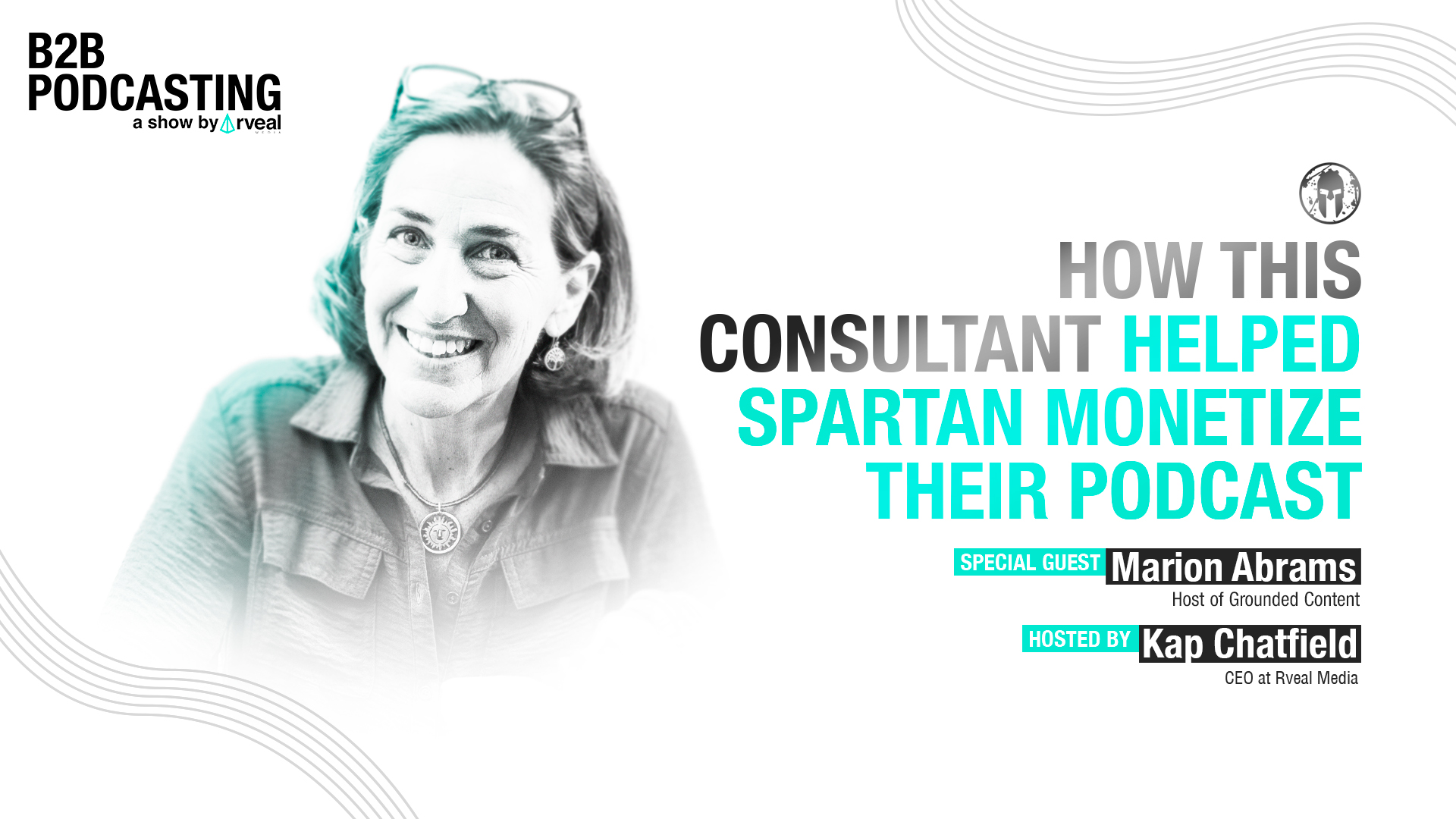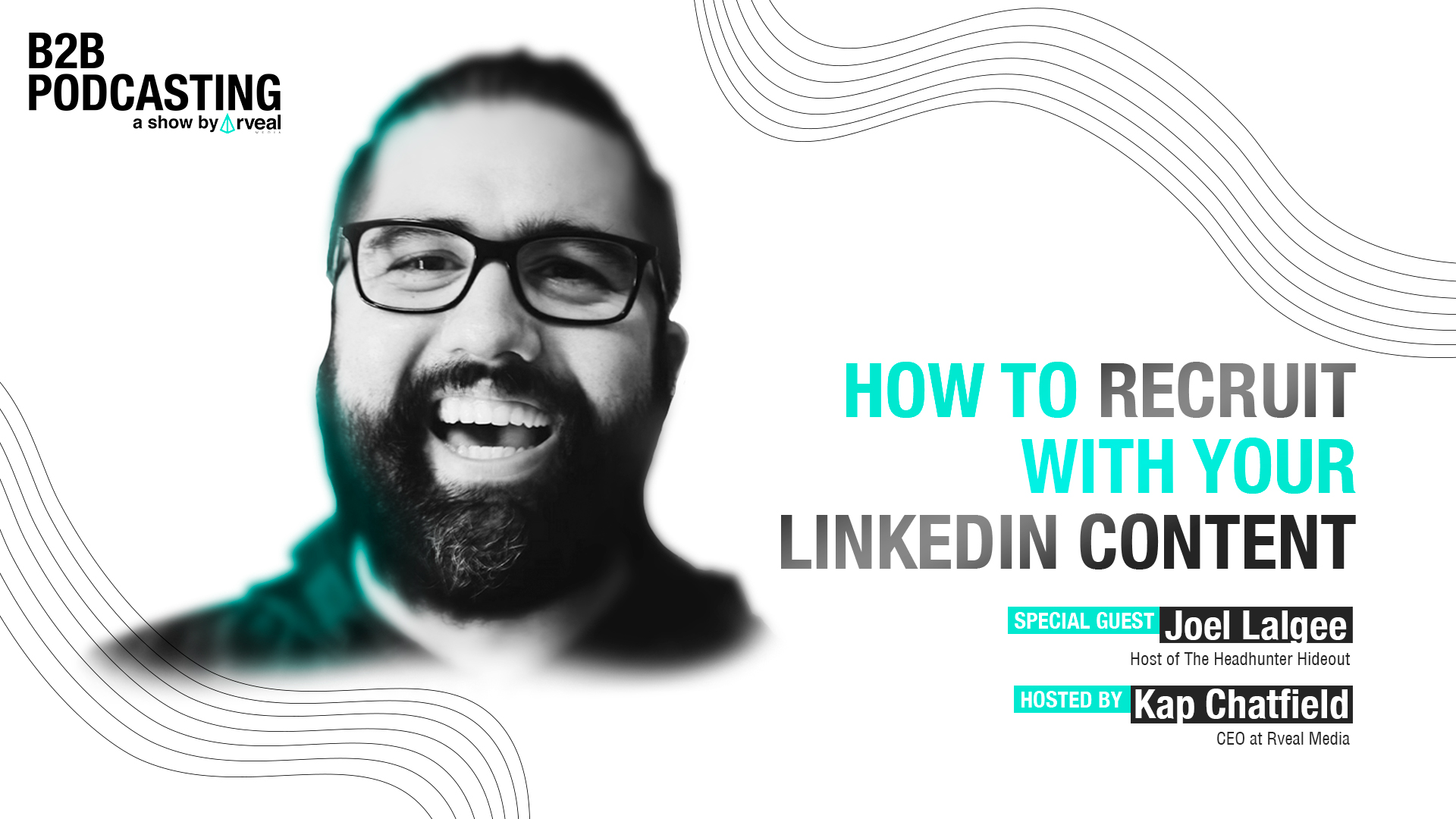How to Write Copy in a way that Actually Converts - with Linda Melone
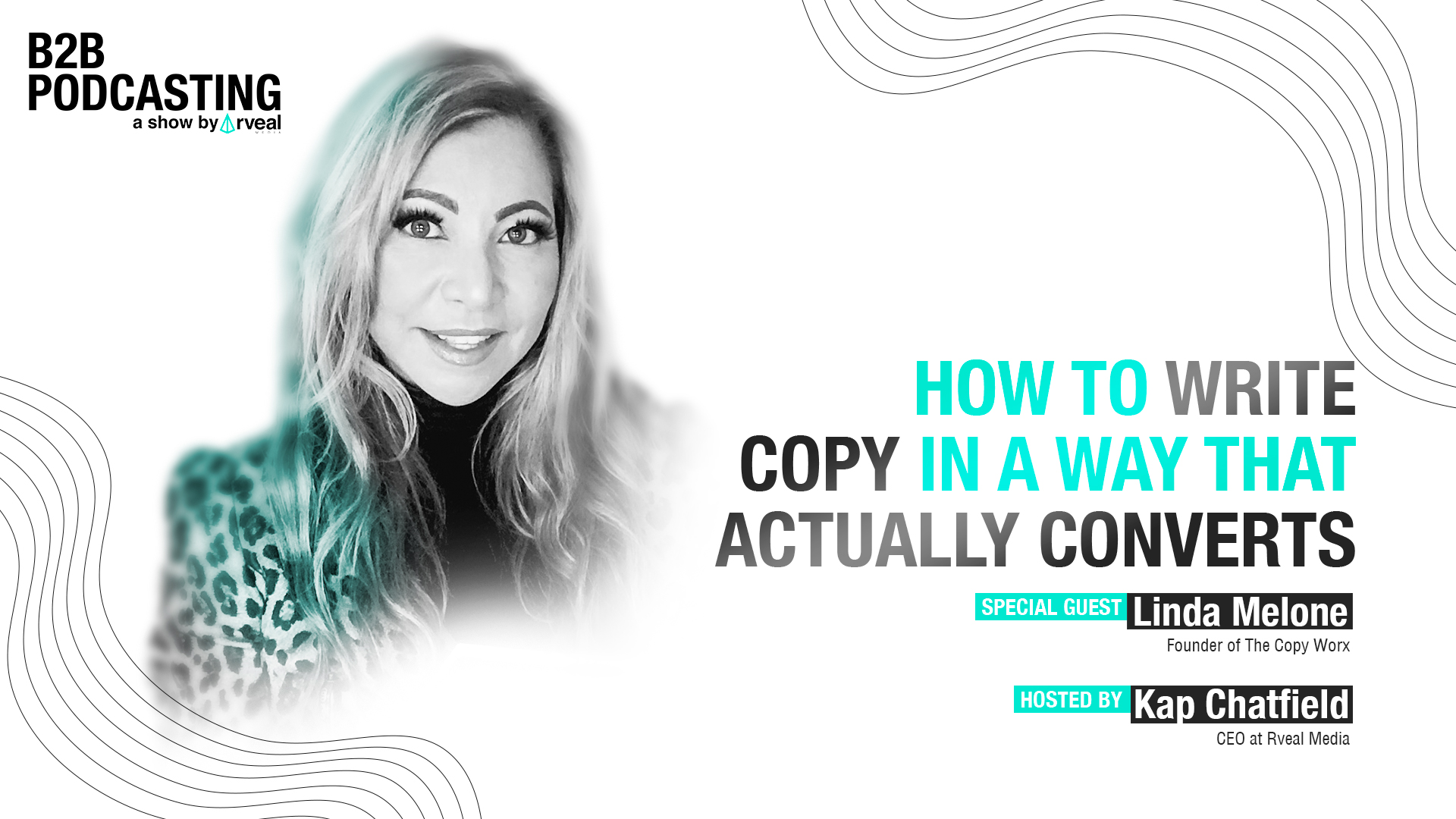
- Rveal’s website: rveal.media
- Rveal’s LinkedIn: https://www.linkedin.com/company/rvealmedia/
- Rveal’s YouTube channel: https://www.youtube.com/channel/UC69p14R2ccMdyUbbmdlWCEw
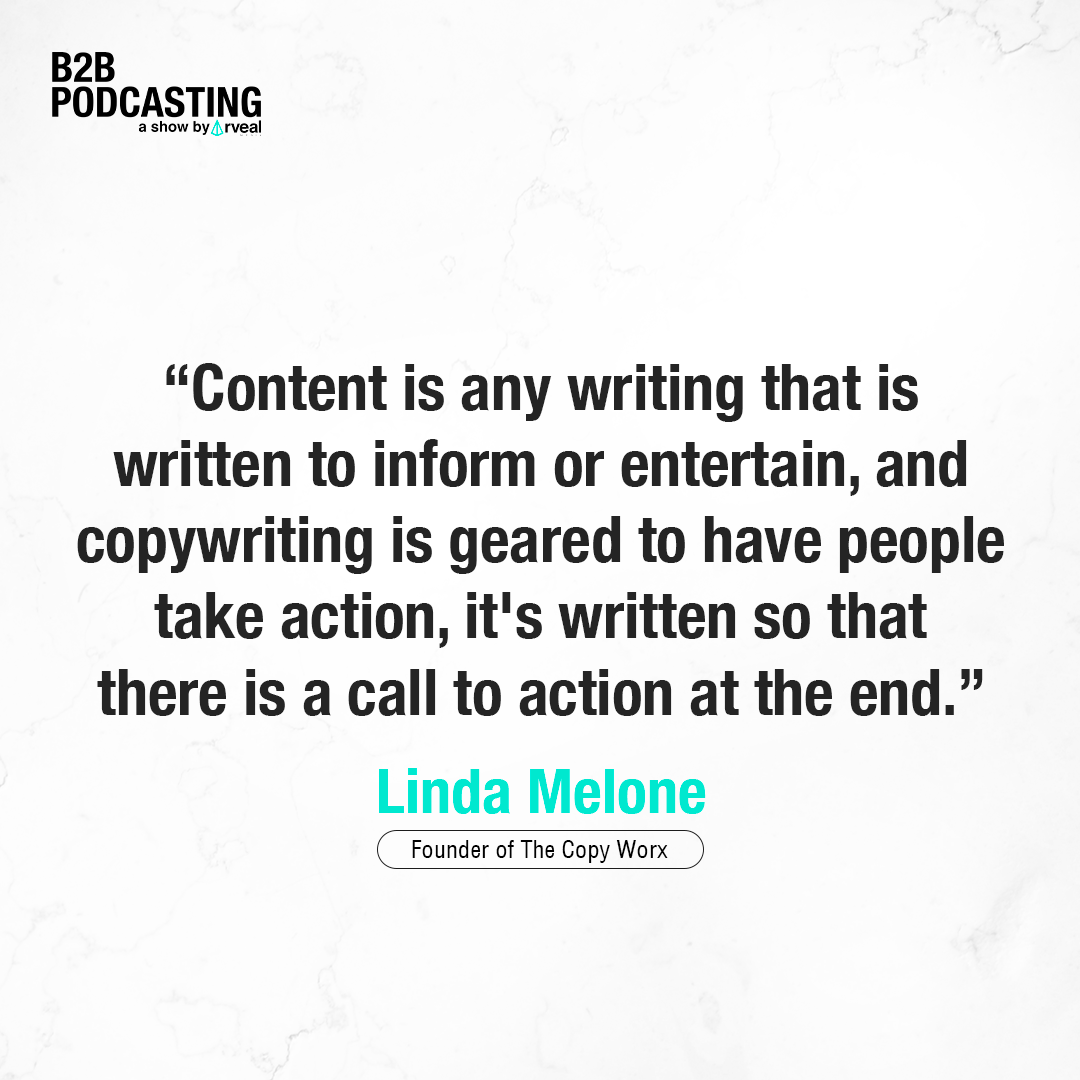
Full transcription:
Kap Chatfield 00:20
Hey gang, welcome back to B2B Podcasting. This is the show for B2B CEOs, sales leaders and marketers to help them skip ads and start being the show, creating content that turns customers into audiences to help them grow their business. I'm your host, Kap Chatfield, the CEO of Rveal Media. And today we have Linda Melone on the show. She is a B2B copywriting mastermind. She's the founder of The Copy Worx. And she is a conversion copywriter. We'll talk a little bit about what that means in just a moment. But Linda, we just want to thank you for having you on the show today.
Linda Melone 00:52
Thanks so much for having me on Kap.
Kap Chatfield 00:54
Okay, so Linda, we talked about this on a pre show call. I made a joke that you're like a cat, you got nine lives, you have a long resume before you started doing this world of b2b copywriting. So in a nutshell, please explain to us a little bit of your career path. And then what got you into copywriting today?
Linda Melone 01:13
Sure. Well, I've always been a writer ever since I was a kid. It was always one of those things. I'd write stories, you know, when I was little, and my teachers used to tell my mom, you know, she's got this writing talent. And so through the years, I went through all different incarnations of careers, like it's actually all sort of culminated in what I do now, because I've had this curiosity throughout everything. I was actually, I have a degree in nutrition, I was in the product development world for a while then I became a baker mpastry chef and a personal trainer of all things. And people would accuse me of creating my own clientele because I had the bakery. But then I started writing fitness articles for a local publication, it was a business publication. And I loved it. And I ended up doing regular columns, they had me doing cover stories, then I expanded into national publications. Ended up writing for MSN, that was one of the biggest ones, their slideshows, and I ended up in Time Magazine health, a lot of fitness magazines. But I pretty much did everything I wanted to do with that field. And so I took everything online, and had a fitness business online. And the good thing about that, even though it didn't work out, I was in it for about five years. And it's just a number of reasons. But I learned how to create an online business. I learned about doing live webinars and how to pitch products. And it all came together when I decided to go back to writing. And then instead of the content writing, I said, "you know what, I'm burned out from that after 15 years of it, going into copywriting." And it was just something that sort of came about because I've been hearing about conversion copywriters. I had actually wanted to hire a conversion copywriter for my fitness business. And when I found out what she charged, and what it involved, I was like, I can't do this. I couldn't afford it. But I thought I was intrigued. And so I looked into it and ended up just studying that and ending up where I am now, which is more it's more on the marketing end than on the writing end.
Kap Chatfield 03:20
It's funny that you said that because what I was thinking, when you said that, was at least from how it sounds is the content writing piece of your of your career sounded more like brand building, storytelling and the conversion part was, "okay, how do we take this story and actually cause someone to take action, which would drive revenue?" So it's almost, and correct me if I'm wrong, but it's almost like a shift from marketing to sales. And if I am wrong, please help me correct my thinking on that.
Linda Melone 03:49
Well, the difference between content and copywriting and I get this question a lot and surprisingly, from marketing people because I think unless you're in the business, you don't really know. Content is any writing that is written to inform or entertain. So think of blog posts, articles, that sort of thing. Copywriting is geared to have people take action, it's written so that there is a call to action at the end. Where usually a blog post and there may or may not be a call to action, but that's to really push see, you know, SEO, honestly CEO, but SEO, maybe some CEOs, but that is more to just get people to get information from you.
Kap Chatfield 04:32
I'm curious, um, so you talked about the content side of your career, it kind of burned you out. What what burned you out about it, specifically?
Linda Melone 04:41
I'm one of these people that I tend to do things 1,000% and then I flame out and I'm like, "okay, I'm done". And I just did everything I wanted to do with writing. You know? I was doing it for, like I said 15 years. I had been in every publication and was nowhere to go with it and then what happened is around 2008, the bottom kind of fell out of print publication. And literally overnight, here's an example: MSN, I was doing six slideshows a month for them. And I was blogging for them with a different editor. I was all over the place. If you Google my name, you will see, I because they still repurpose that material, I'm all over there. And overnight, that went away. The editor emailed me one day and said, "I am really sorry, but we are not using freelancers anymore". And that was the day when I just got up from my desk and said, "I'm going for a walk, because it was so bad". That was like three quarters of my income, just boom. And other publications started folding, you may or may not have noticed, you know, a lot of the publications, even the ones that are out now are very thin, people don't read print anymore. And so I was writing for a lot of print, and they just weren't around. And then when they went online, they were like, "Okay, I know you used to get like $2,000 for this article, we're gonna pay you $200. And we want to buy all the rights from you". Like, that's literally what happened. So I said, "Okay, I'm done". So between that and being burned out, it was just the perfect storm of time to get out.
Kap Chatfield 06:16
Yeah. Oh, my goodness. So was there anything about conversion copywriting in regards to, how would attributes, I would say probably more cleanly, to the growth of a business, particularly for your client? Was there something about that, that attracted you to that type of writing? Or was it simply just want to do something new?
Linda Melone 06:36
Well, it is, I was attracted to it because it's really about marketing, and I love marketing. I just love just trying to figure out how is this gonna work for someone? And how am I gonna express this? I personally, I think it's way harder to do, because where I used to have, as I said, like a 2000 word article to write, okay, so I get all my people lined up, my experts and pull together the story. Now I need to get someone's attention in a header of a website, or I need, you know, for my clients, and that takes so much more brain power. I can't it's it was way harder than I thought it would be. You know? I mean, I've gotten, it's gotten easier over time, but it's still it takes a lot of time. And that's one of the things I think that people don't, don't get with copywriting, especially conversion copywriting. But it's conversion copywriting is really geared toward, everything is geared to convert the reader to take some kind of action. It doesn't necessarily have to be a sale, but it's either, you know, "click this button", "sign up for my opt in", you know, join my, my group or whatever it is, but they have to do, there's some kind of action that you want them to take.
Kap Chatfield 07:49
So my background, I don't know if I've got a chance to share this with you, my background, I'm actually a filmmaker at heart. So I went to film school, University of Miami, about a decade ago. Really fell in love with the structure of storytelling. I love like the technicality of filmmaking. But there was something about narrative arc that really, it spoke to me a lot when I was in college, because I saw, once I learned that story actually has a structure to it that is repeatable, and predictable, I started seeing story structure everywhere. I saw it in emails, I saw it in books, I saw it in jokes, I saw it in the news. It's it became like, oh my gosh, like, this is a foundation for all of all of communication. And I'm curious, because even as you're talking about, you know, we had talked on the pre show call about like pain points and knowing your audience and their desires and things like that. I'm curious, does does good copywriting similarly have a structure that can be noticed or identified? And if so, what's the what's the structure that you follow when you help a client create a copywriting narrative?
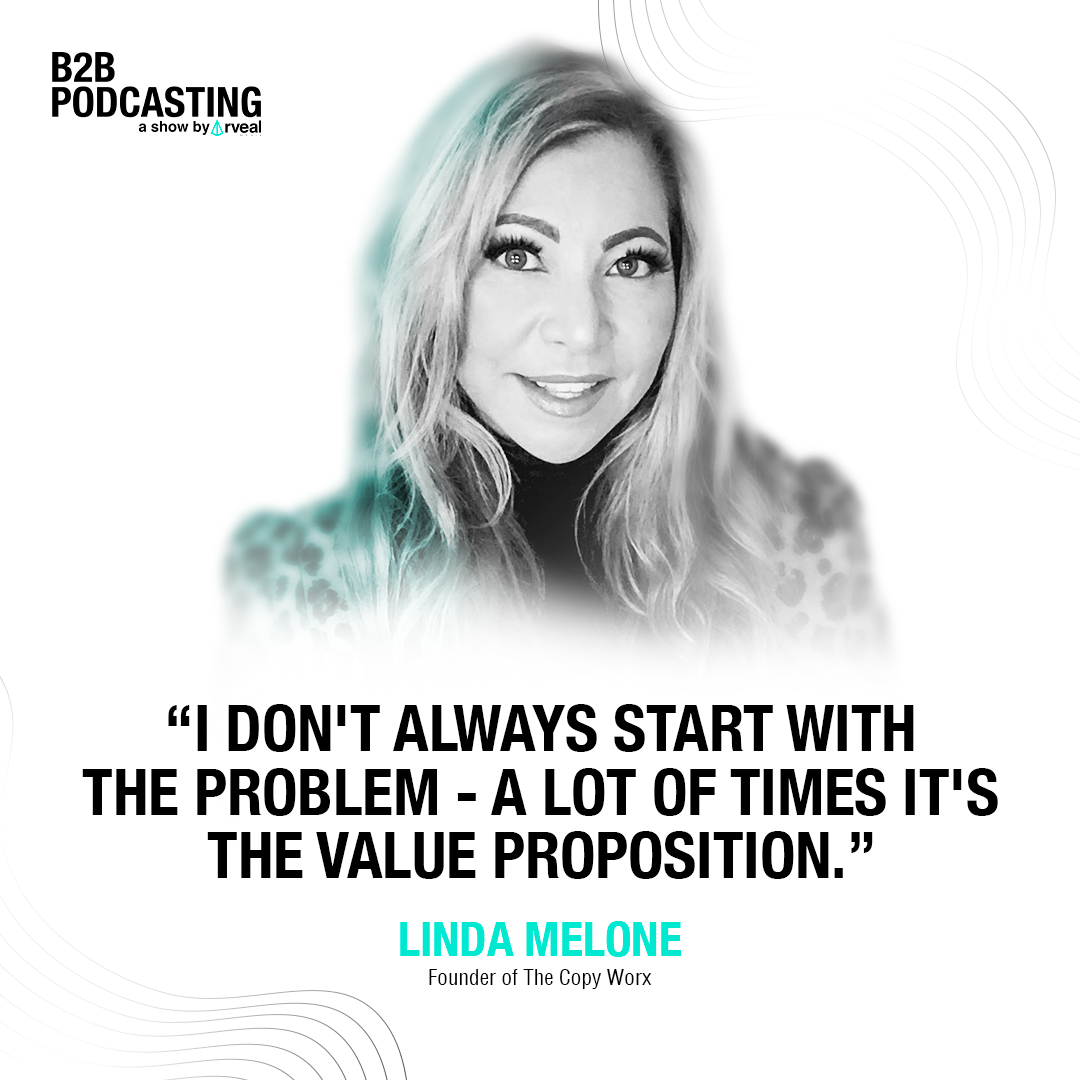
Linda Melone 08:59
There's a lot of what we call formulas. So there's a lot of acronyms out there. In fact, I posted one on LinkedIn recently, the most popular one is PAS, Problem, Agitation and Solution. And I always say, if you don't know what to write, whether it's an email, whether it's, it could be a post on LinkedIn, which is what I try to do, you know, you present the problem and then you kind of tweak it like really, you know, pour leaven into that paper cut. And then because it's the only way people will make a change, or will take action is they have to really feel that that issue, and then you present the solution. I mean, that's the simplest one. There's a whole I have a little ebook that I wrote that has 15 of these formulas and it kind of goes into in depth how each of them works. But if you just know the PAS one, you really you know, you don't need a lot more and you can use it for everything.
Kap Chatfield 09:01
So when you're, when you're working with your clients, is the problem the thing that you think, I mean, I'm sure that's like, in that order. Chronological order is probably one of the first things that they need to see on their website or an email in order to really grab attention, right? It's like, like I mentioned jokes. Like a joke, you open up with a question, knock knock, who's there? Why'd the chicken cross the road? Terrible jokes, but you stick around because it's like, okay, the problem is, I don't know the answer. And I need to, I need to find out what the answer is. Do you, in your, in you working with your clients, in your consultations, do you recognize that, like, the problem is the is the thing that they have the most difficulty creating clear messaging around? Or is it something else?
Linda Melone 10:40
Yeah, a lot of times, it's the problem. But it just as a side note, it's we I don't always start or create websites that start with the problem, it depends. A lot of times it's the value proposition. So it could be, in fact, it could be a quote, you know, I've done, I've taken if I'm interviewing people for a client, and they tell me something I think is like, mic drop sort of thing. Alright, a lot of times, I'll put that on the header. And that could be what's going to attract eyes. So it's not necessarily the problem. I think, I think most marketers know what the problem is, but they don't know how to present it. Because you can't, it's not as easy as, "hey, I know that, you know, I know you need to lose weight and here's the way to do it." It's, you have to, like you said, like paint a picture, you have to tell a story behind it. And that's, that's, it should capture their attention so that they keep reading. And there's a real art to that.
Kap Chatfield 11:41
I want to, I want to put you to the test. Can I put you to the test?
Linda Melone 11:46
No
Kap Chatfield 11:47
I'd love to, I'd love the roleplay a little bit and just allow you to ask me questions that help us get to a place of better clarifying. Maybe not necessarily the copywriting thing on my website, but how I could communicate what we do for our clients or our customers. So are you cool with that? Can we give that a shot? Okay, so in which, in that case, go ahead ask me whatever the beginning question is that you would ask a client?
Linda Melone 12:14
Well, why do people seek you out? What are they looking for?
Kap Chatfield 12:19
Oh, man, that's a good question. If they can even find me, I don't I'm not sure, I think it when people come to me, typically they come to me because they know that they have a marketing problem. But what I've noticed is that when they come to me, they've kind of like self diagnosed what their marketing problem is. And it's, you know, we usually go a little bit deeper and we discover what they thought they needed, whether it's a website, or social media ads, or whatever, Google ads, typically not what they need at all. But they need marketing so that they can help grow their business make more money.
Linda Melone 12:52
Okay, so how do you like, can you describe, if you were to have them, because this is a question I ask my clients, like, walk me through a typical day. Like, of you getting aggravated with like, this is for your client. What is it, where is it that they are seeing this problem, or disconnect?
Kap Chatfield 13:14
I think, for me, what my clients, they typically have like very, it's interesting, because like, it's similar to the value proposition thing that you were sharing, like my clients, they have very specific vision for their market. As we talked about in a pre show call, they're actually in a place where they're in kind of like this thought leadership category, where they're coming up with solutions for the market that that the market doesn't necessarily have language for yet. So it's like, instead of creating a widget that competes with a lot of other widgets like it, and it happens to be shinier, and just more beautiful interface and easier to use, and more cost efficient. They're like creating a whole new category. And people don't have language for it yet. So they're like, I don't even know how to communicate the value of this thing.
Linda Melone 14:04
I think one of the things and like, you had mentioned this to me on another call that we had about future pacing. I mean, if you can get people to see what how their life would be different, how their business would be different using your product, that would be something that would enable them to make the decision. So I mean, how would they? How would they get around to that on their own? Like that? What is, would you point out to them, like, "Hey, this is you know, this this isn't working", or do you ask them like, what is not working? And how do you it's hard to do this kind of on the fly because I have like this huge questionnaire I send to people so, it's,
Kap Chatfield 14:48
Oh, do you really? I
Linda Melone 14:49
Yeah I mean, that's how I start, it's a discovery call and we get into, you know, all of this.
Kap Chatfield 14:54
Well, I'm tracking so I'm I'm good with this. For me, when I'm talking with my clients, it's usually like a diagnostic. I guess, kind of like what you said. But it's I just kind of I just ask questions. I ask them, "well, what, you know, what are you currently doing with your marketing? And do you have? Have you been tracking results for that?" Another thing that I do is, I asked them, Who is a customer or a client of yours that has been really happy with what you've done for them? And kind of walk through the story of what their problem was, how you solved their problem and then using that as like proof of, hey, this is really what you're doing here. This is what, this is how you're actually changing people's lives practically. So those are a couple of tactics I use to kind of get to the bottom of what their service or software product actually does.
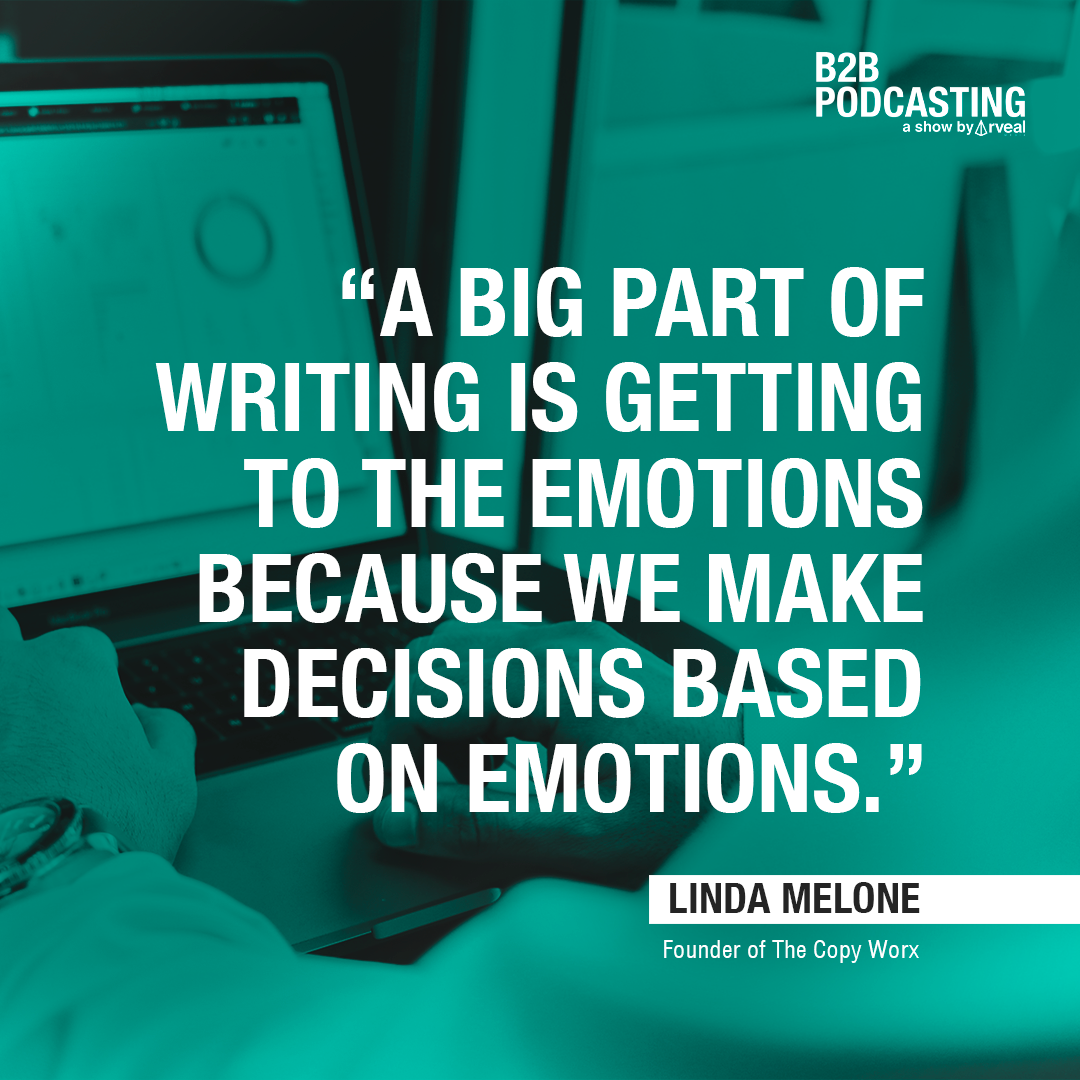
Linda Melone 15:45
And what have they tried? You know, what, what has worked, what does, hasn't worked? And I do like to get into this, a lot of talk about, you know, should you talk to the competetition, or should you research the competition? I think absolutely. Because you want to find where the gap is between what other people are doing that are in your world and your niche, and then what the customer is not getting that they want. And there's that there's an intersection there, that's where you can sell them something that's the solution that they don't know is there. It takes it takes a lot of digging. I mean, there's like a, you know, when I talk to somebody on the phone, it's really, we go off on a lot of tangents. And I ask questions, if it's relevant. If it's not relevant, I'll pull him back into the main question. But I did that when I did interviews for content writing. I'd interview some really high level people that they knew their subject, but didn't know how to express it. So it took a lot of, you know, okay, let's put this in layman's terms kind of thing. I don't know if that answers your question. Or if the,
Kap Chatfield 16:50
It kind of does. I want to go, I want to go deeper into the value proposition thing, because that's where I feel like you're really getting to that when you're sending out this long questionnaire, and really trying to understand like, who are you? What are you actually doing? What have you actually tried? And really trying to hit, I mean, like I mentioned, I think what we're trying to do for both of our clients is very similar. So for you, when you're when you're trying to mine out what that value proposition is, walk us through the process of that?
Linda Melone 17:21
Well, a big part of it is getting to the emotions. Now because we we make decisions based on emotions. So I try, like some of the questions I ask, for example, are what is, you know, what is your client, what keeps them, you hear this all the time, but it's like, what keeps them up at night? What are, trying to think of some of the questions, because the questions vary depending on the client. So if it's, for example, a lifestyle client or a health client, it would be, what is the how, like, maybe it's a family dynamic that's being affected, say the person is really unhealthy? You know, how do you see yourself? Like, for example, one of my clients, I came up with a headline that was, you know, we help you be around to, to, we help you be strong enough to play with your grandchildren or something to that effect. Because the client told me they are very family oriented. So anything to do with family, like do you want to be there for your kids? So we take that the decision off of you know, okay, it's not about just weight loss, what is the feeling that you'll have once you overcome this problem? How is it going to affect your family? How is it going to affect your lifestyle? If you'd like to travel? So you know, maybe you can't travel anymore? I mean, you get into, like, what is it that they want to do? And what is their problem preventing them from doing? And then you really play that up. That's usually, that's a powerful way to get people to think about what you know, the solution is.
Kap Chatfield 18:52
And that's a future pacing thing, right? And then really painting that story for them.
Linda Melone 18:57
And also the negatives, you know? Like so, because people think, well, if I don't do anything a year from now, because I'll say, where do you see yourself a year from now? And if they say, well, you know, or the, if it's a client that has somebody that is trying to lose weight or getting fit, so I'll just be in the same place. No, you won't be in the same place, you'll be worse. And so that, you know, we think that okay, well I'll just stand still and nothing's gonna happen. Yeah, things will happen. It just won't you won't be in control of them, then, you know, so either get a grip or don't.
Kap Chatfield 19:28
One thing I'm curious about is, I'm noticing in b2b, particularly with the people that I follow on LinkedIn, there seems to be this trend. And I think it's a great trend. I'm on board with it. But it seems like these b2b marketers are really trying to push the whole b2b world into being more human with their marketing and thinking from thinking, you know, not just like, because we know b2b has just been so it's been so boring. It's it's lacked heart. It's really It's been so cold and corporate and generic and stock photos and all that sort of stuff. And I saw a post by a guy, I think it was Dave Gerhardt a while ago, and he said, b2b marketing is or excuse me, b2b, b2c marketing, is marketing to people and b2b marketing is marketing to people in business. Which is such a helpful reminder of, "hey, people communicate to each other with emotion", they communicate to each other with pithy sentences. They don't, they don't go on and on and on. It's like, they talk like they text so to speak. My question to you is like, what, what tensions have you seen, or do you see attention still, in b2b brands lacking this emotional component with communicating their message?
Linda Melone 20:48
I think it started to shift, like you said. You know, I've seen more and more people have asked me about it, and there's been so much discussion on LinkedIn, I think there is a shift into that direction, because people are realizing even if you're targeting a business, there is a person behind that brand, and behind that business, that company. So I think it's turning around, and especially with everything being so automated, you know, we're just tired of it, you know? And just to be able to get on the phone with an actual person, I mean, you have a leg up on all your competition if you do that. And that's, it's funny, because I see that being played up over and over, like, you know, this company is great with their customer service, because I actually get on the phone with a real person. And why is that become so, you know, rare? I think it's starting to loop back around. Hopefully.
Kap Chatfield 21:41
I know, it's like it's doing doing things that aren't actually scalable, like getting on the phone actually talking to a human being. That's what builds brand. I'm curious about, like, do you see people that take copywriting, like understanding copywriting seriously, do you see that affecting their communication for the sake of persuasion beyond just the writing platform? Like if they're on calls with customers or with their with their team? Have you seen that positively affect their communication?
Linda Melone 22:12
Oh sure. I mean, the clarity, you know, that's the biggest thing is to be able to just say what you do, and how it benefits the person. So I did a, the one company that I have worked for, I'm still working for them. I created three value propositions for them. So were all kind of related, but I didn't know what CEO would like. And he said, "Can we use all three?" I said you can do whatever you want with them! He had his, he has a franchise, and he had his people at the franchise memorize them, which and he said that it actually he has the memorize them, and they have, they have them written out on their, on their, in the shops, actually. So that was like the biggest, you know, I mean, that was just the biggest accolades I could possibly get. So they do, they use the language, and it helps to put everything succinctly into a nice package that is clear to people who may want to buy.
Kap Chatfield 23:10
Oh, that's so good. I think that's so important for leadership. One thing that I'm like really passionate about, that's why this show, I don't know how many CEOs actually care to listen to this content, but my desire, and I see the need for it, that when when content creation, and it's really content creation, whether it's copywriting or a podcast or video content, it's all about communication. And when when CEOs and founders and C-suite level leaders of the organization embrace these disciplines, it actually helps them grow in their leadership, which it sounds like that's what you experience with one of your clients, I think it's so smart.
Linda Melone 23:49
Yeah, and a lot of times people think copywriting is what they consider, I guess, a soft skill, like, oh, anyone can do it. If I had time, I could do it. And it's, it's just not that easy. You know, I think because of you know, sites like Fiverr and Upwork, and I use those for, for different little things. But you can get if someone tells you, "I can do a sales page for you in a week, and I'm going to charge you $100." I mean, just run, that you're not going to get anything from it. And but there's people comparing someone like me, who's been at this for years and really studies it with someone who just decides on a weekend that I'm going to be a copywriter, and it's just not. It's not comparing, you know, it's just apples and oranges. Just totally different thing.
Kap Chatfield 24:36
What would you say is the biggest problem that b2b brands face? Maybe not necessarily just with copywriting, but in general with telling a story. What's the biggest problem that they face when trying to tell stories that actually drive revenue for their business?
Linda Melone 24:54
I mean, so much of it depends on their audience. You know, it always comes down to that. It has to, the story has to really relate to the problem they're going through. They just have to thoroughly understand who they're talking to, and really know what the problems are and what their challenges are, and not just think, "Oh, I think they're going through this". That's what I hear a lot from people is, "Oh I know my audience". And even with my own business, with the fitness business, so I was targeting women over 50. I'm over 50, and so I thought, "Oh, I know. And I'm a fitness person. So you know, I can just, I know what they want". When I actually spoke to people, they were talking like I don't, I don't have any kids, I don't have grandkids then. So a lot of women were saying, I don't care about getting my abs flat, I just want to be able to get up off the floor when I've played with my grandkids. That's something I would never have thought of. So that sort of thing. What are they really being challenged with? And understanding that on that on their level, is what I think is the biggest challenge.
Kap Chatfield 25:54
Oh, that's so good. I want to make this really actionable for people because a lot of these people, they're not going to be copywriting savants like you. Like you've spent your entire career really better understanding how to communicate through this written language. So but at the same time, like we talked about these leaders, or these marketers or the sales leaders, understanding these these tactics and, and copywriting communication, it can transform their business. So with that alone, what would be a tactic that you could recommend for the CEOs, founders, sales leaders and marketers to better understand their audience and what really matters to them?
Linda Melone 26:34
Well, they have to talk to them. They can't just send like, actually talk to them. Because you send questionnaires, and I've had people say, just send me a questionnaire. The thing is, if you send something where people fill it out, they'll they'll tell you, they'll have time to think about it. And they'll, they'll want to sound good. And you know, if you get them on the phone or get them on a call, and people hate getting on the phone, I understand that. But once they're on the phone with you, and you really express a genuine interest, like I just, you know, I want to know, like, what is it that is affecting your life and make it all about them. They want to talk about themselves. So they're going to tell you, and then if you you know, I said for too many people just walk me through your day, you know, what is it that? What are you doing it, even like, what, what podcasts do you listen to? What TV shows? What's your lifestyle like? Do, you know? And it, those those little things, I'll weave into the copy too, so that they'll say, oh, you know, a lot of people have golden retrievers, you know, I go for a walk with my dog. And so maybe that'll be woven into it. But just all those little details. That's what makes the story come to life is like those details, yeah, the little things.
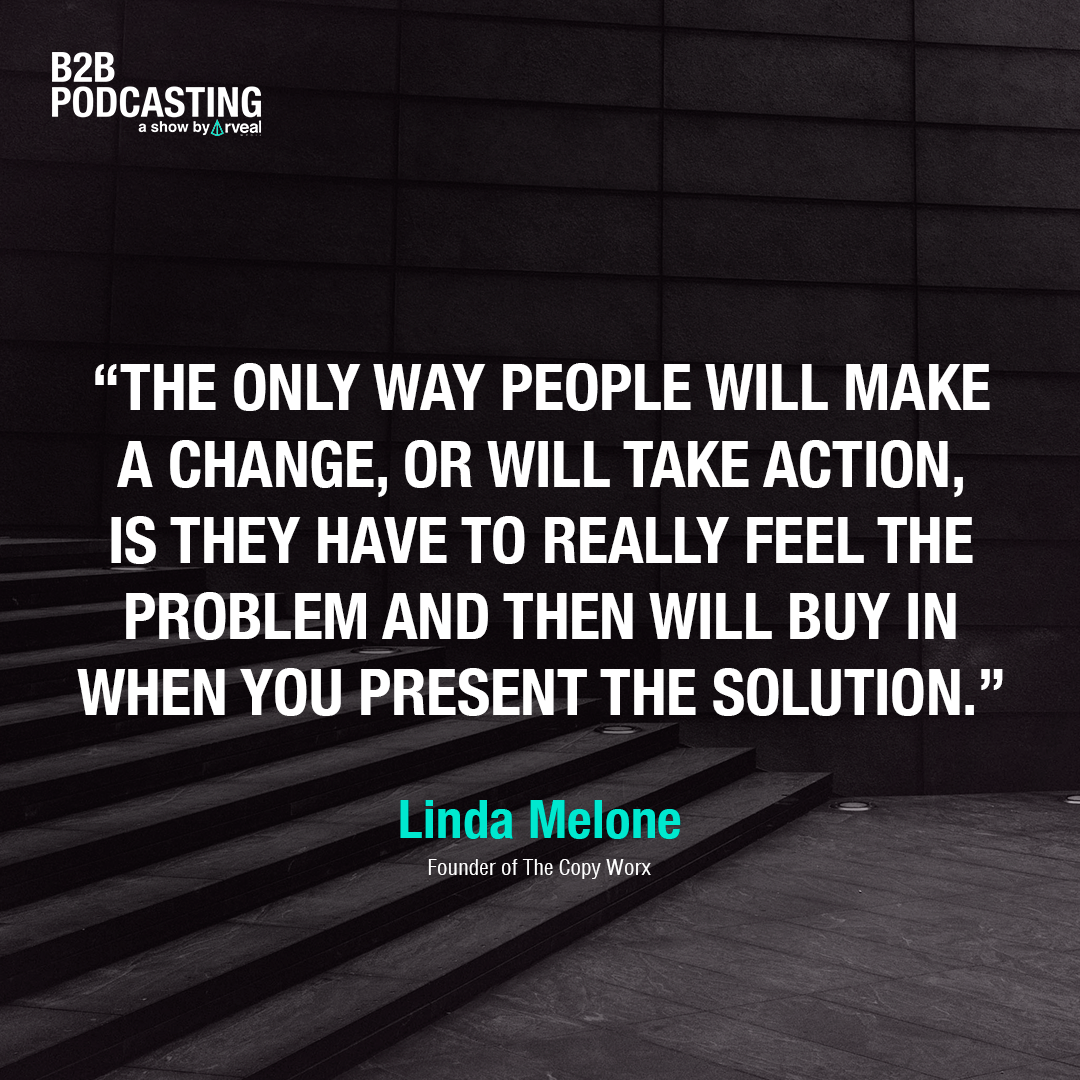
Kap Chatfield 27:46
So you're a content creator, you create a lot of, you write a lot of amazing stuff on LinkedIn, keep it up, by the way. And for you guys who are listening and just want to see some of her stuff so that you can, you can see that she's the real deal. We'll put her LinkedIn profile link in the description in the show notes of this episode. So check it out there. But you are, you're in the process of of launching your own podcast early 2022. Please tell us why as a copywriter, you felt like you needed to make this move, because obviously it's an audio centric, medium. So why did you feel like you wanted to do this to help you build your brand?
Linda Melone 28:24
There's a lot of reasons actually. For one I was I was a co-host on a Bowflex radio show like a couple years ago, and I really liked it. And the other, but the most important thing is, I feel like I have a lot of good information that I want to get out there and people don't always want to read and they listen to podcasts when they're walking, when they're working out. And it's also there, I've studied a lot of copywriting podcasts, especially the past couple of years. And I want to do something different. Like everyone talks about copywriting, they have copywriters on to interview. And that may be part of what I do, but my focus is going to be more on the marketing part and copywriting and marketing and it's b2b. So, until up to this point, I've been deciding trying to decide what my focus is going to be, what, how is it gonna be different? Just like everything else, you know, what's my value prop? So I'm not 100% clear on it. I like to let things kind of grow organically. I see where people are asking questions and where I think I could help and that's how I'm going to just grow it but, and also a lot of copywriters are introverts. I'm an introvert, but I'm like a social introvert. I can, yeah,
Kap Chatfield 29:34
I'm kind of the same way actually, I get it.
Linda Melone 29:37
I never heard of being a social introvert until somebody on LinkedIn had a quiz and they said, "What kind of introvert are you?" And I'm like, "well, I'm not shy", you know, but I like after this podcast I'll need a nap. I just needed,
Kap Chatfield 29:52
You, that's you, you got me down. Like I like people, I like being in front of people. I love public speaking. But after a party, like I'm good for the weekend. I just want to chill at home. I don't want to see anybody.
Linda Melone 30:05
So that's the thing, and most most copywriters are introverts. So they wouldn't get on a podcast, they wouldn't do their own podcasts. So I get out of my comfort zone, and I just decided I'm going to do it. And so I think that that would set me apart too. It's just to get more content out there and in a different way.
Kap Chatfield 30:25
That's awesome. Well, I think you're brilliant at what you do, Linda, and I'm really grateful for your time on this episode. We're coming to the end of the episode right now, so I want to give the audience an opportunity to check out you, check out the new show, that will obviously be coming out early 2022. But Copy Worx, what's what is Copy Worx by the way, and and how can people get connected with with that?
Linda Melone 30:47
It's the website is thecopyworx, W or x.com. So it's, my website has sort of an overarching view of everything I do. I have some productized services I have, I have some free resources, a couple of them there, and that everything that I do is sort of in it, it needs to be a little better organized, to be honest. It's like you know, the writing is I hired myself to do the copy on it. So I researched that website as much as I would research anyone else's. So you can kind of get a feel for my writing from that. But you can check out what I have on the on the site.
Kap Chatfield 31:26
Super cool. On the website, I also see that you have Jesus McDonald as a as a testimony. We actually we're having him on the show too. He's a great guy. So you're clearly in a good network. So everybody, make sure you check out Linda's LinkedIn profile, connect with her, follow her. Check out The Copy Worx, and stay tuned for her show that's coming out this early this upcoming year 2022. If you follow her, I'm sure she'll give you some updates about when that's coming out. Linda, thank you so much for sharing your expertise with us on the show today.
Linda Melone 31:57
Thanks so much for having me on Kap.

